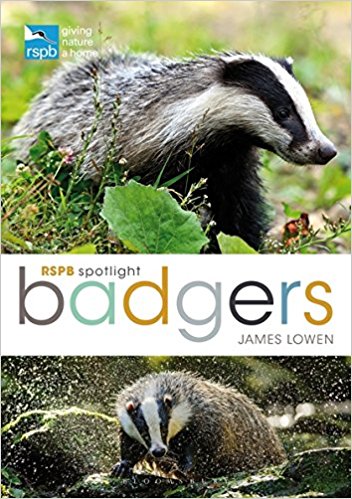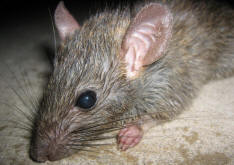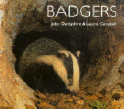 |
Small Mammals
| RSPB Spotlight on Badgers book |
 |
James
Lowen explores the lives of badgers and their communal
living, feeding habits and threats to their conservation. Click
here to buy:
Paperback edition
Kindle edition
|
Badgers
are generally too slow moving to be adept at hunting other animals; but they
will eat Dead Animals and Birds (Carrion), sometimes, hedgehogs.From time-to-time badgers will dig up the nests of rabbits,
mice, rats and voles (as well as amphibians and small
mammals and eat
the young animals inside. Normally, adult rabbits and hares are too quick for a badger to be able to catch, but the young
are often left static in a nest.
When a badger has eaten a rabbit the telltale signs are that the animal has
been neatly skinned, leaving only the stomach and caecum (a pouch
connected to the junction of the small and large intestines).
 Whilst some people complain about minor damages done by badgers
(like rolling in fields, or
garden damage), they are highly beneficial by helping to maintain a lower population of
"problem" species - like rabbits, rats and mice, which can cause even
more damage. Whilst some people complain about minor damages done by badgers
(like rolling in fields, or
garden damage), they are highly beneficial by helping to maintain a lower population of
"problem" species - like rabbits, rats and mice, which can cause even
more damage.
Some badgers also eat
hedgehogs. Some individual badgers, have learnt
the skill of using their long claws and powerful
feet to open up a hedgehog - even if it has rolled
itself into a tight prickly ball. Importantly, this is not
something every badger either will or can do, so some hedgehogs
may be safe whereas others will be "at risk". If you
ever come across a hedgehog "skin" - in other words, the
skin, prickles, head and feet but no innards - it is likely that
your badgers have learnt the trick.
Foxes may also eat hedgehogs, but theit telltale sign is that
they tend to eat the skin of the hedgehog as well. Note though that badgers will also eat carrion (dead meat) -
just because a badger is seen eating a hedgehog, it doesn't mean
that it has actually killed it. After all, the badger may have
just come across a dead hedgehog that it decides to eat (for
example, dead after not coming out of hibernation or having been
one of the very many run over on the roads).
Do badgers eat family pets?
Cases of badgers killing active, healthy family pet cats and dogs are
exceptionally rare. Most healthy cats and dogs know to stay well away from
badgers; and most can get away quite easily. The overwhelming numbers of reports
of badgers seen eating pets, is that the badger has come across an animal which
is immobile because it is already dead or dying (as a result of predation by
dogs or foxes or due to a road traffic accident); and is using the poor animal
as a free meal. This is only what your cat or dog would do if it were living in
the wild. As large animals, badgers will often take food away from cats, small
dogs and foxes; so badgers are often blamed for killing something; when all they
did was to steal a meal from a smaller animal. If you keep small pets in a
hutch or a pen, it needs to be strong enough to keep out ALL predators (cats,
dogs, foxes and badgers). We strongly recommend checking the strength and the
security of all animals pens, to make sure your pets are safe from predators or
all kinds. This advice applies to all common pet species, such as cats, dogs,
chickens, ducks, guinea fowl, caged birds, guinea pigs and rabbits. Low strength
wire netting (such as chicken wire) may be able to keep small animals in their cage or run; but it will
not stop a predator. If you keep pets outside at night, you may wish to maintain
their security by using heavy-duty wire mesh or weld-mesh.
| Perfect Badger Photos |
 |
The best photos you have ever seen of badgers by John Darbyshire and Laurie Campbell. Perfect photos and great writing. Click
here to buy:
Badgers by Darbyshire & Campbell
|
|
